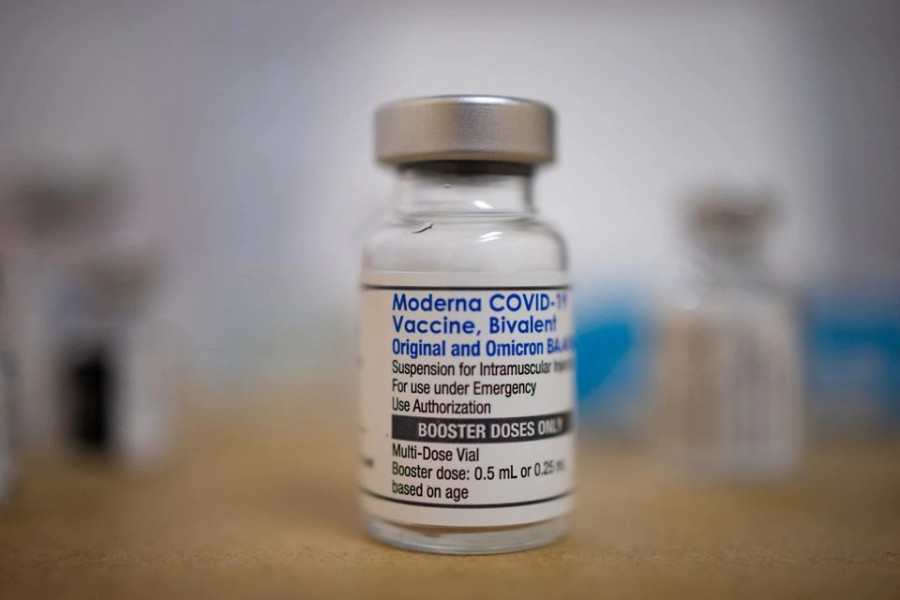Health
COVAX to supply 1.5 million Covid bivalent doses to Nepal shortly
Health Ministry officials say the vaccine doses will be used as first and second booster shots.
Arjun Poudel
Nepal is all set to receive 1.5 million doses of bivalent Covid-19 vaccine from the COVAX facility, the international vaccine-sharing scheme backed by the United Nations.
Officials at the Ministry of Health and Population confirmed that they have been assured that the vaccine doses will soon be supplied.
“Yes, we have been informed that the vaccine doses will be supplied at the earliest,” Dr Bibek Kumar Lal, director at the Family Welfare Division, under the Department of Health Services, told the Post. “We too have started our own preparations, accordingly.”
The bivalent Covid-19 vaccine includes a component of the original virus strain to provide broad protection against Covid-19 and a part of the Omicron variant to provide better protection against the infection of coronavirus caused by the Omicron variant.
The vaccine is called bivalent Covid-19 vaccine, as it contains two components. Doctors say a bivalent Covid-19 vaccine may also be referred to as an “updated” Covid-19 vaccine booster dose.
According to a source at the Health Ministry, the funding for the vaccine doses will be provided by the French government to the COVAX facility.
The French Embassy in Kathmandu had offered vaccine doses directly, but officials preferred to receive them through COVAX. Nepal will be among the first countries to use bivalent vaccines once the vaccine doses arrive, officials said.
“We have sought permission from the Department of Drug Administration to import bivalent vaccines,” said Lal.
To import any new vaccine into the country, authorities concerned have to take the approval of the national drug regulatory body, as per the rules.
Officials at the Logistic Management Section said the proposed bivalent vaccines are part of 9.2 million doses of vaccine committed by COVAX in the past. Of the 9.2 million doses of adult Pfizer-BioNTech vaccine committed by the facility, only around three million have been supplied so far.
Officials said the United Nations-backed international vaccine-sharing scheme had offered vaccine doses near their expiry date in the past, which Nepali authorities had refused to accept.
Due to the failure of the COVAX facility to supply vaccine doses on time, Nepal’s plan to start the second Covid-19 booster shots remains halted for a long time.
Officials had planned to administer the second booster shots to vulnerable groups—elderly people above 60 years old, those having compromised immunity and the frontline health workers.
The World Health Organisation’s Strategic Advisory Group of Experts on Immunisation (SAGE) and the National Immunisation Advisory Committee have also recommended starting second booster shots.
The Pfizer-BioNTech Covid bivalent vaccine is authorised for use as a single booster dose in individuals, five years of age and older.
“Due to various reasons, we could not start the second booster shots on time,” said Lal. “The bivalent vaccine doses will be used as second and first booster shots. Those who have not taken their first booster shots and the other people in priority groups will be administered the vaccine.”
The bivalent vaccine offered to Nepal is believed to have been developed by the Pfizer-BioNTech company.
Nepal started administering the first booster shots in January this year prior to the WHO SAGE’s formal decision on the same. Booster shots were provided to frontline workers, including health workers, journalists, and bureaucrats at the initial stage, which was later extended to all above 12 years old.
However, only 792,791 (or around 27.3 percent of Nepal’s population) have been boosted. Despite repeated appeals by health agencies, the uptake of booster shots has not increased significantly.
Experts say vaccination is the only reliable way to prevent severity and deaths from coronavirus infections and suggest administering second booster shots to the elderly population and those with comorbid conditions who were administered the first booster shots some six months ago.
So far, 22,324,923 or 76.5 percent of the total population has been fully immunised.
Nepal has so far received Covid vaccines of various brands—AstraZeneca, Vero Cell, Moderna, Janssen, Sinovac-CoronaVac, and Pfizer-BioNTech—including the paediatric doses.




 9.83°C Kathmandu
9.83°C Kathmandu















